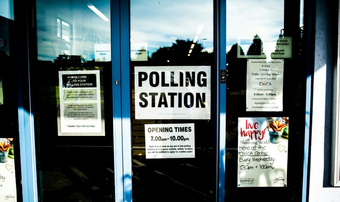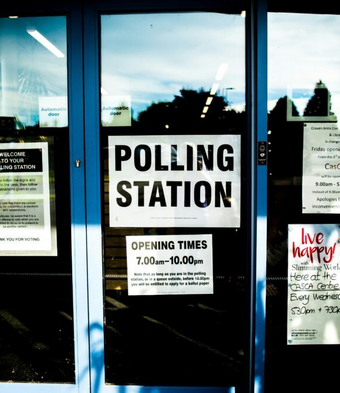Reflections on 2024

As I write my final message of 2024 there are four days left of Advent, a season of anticipation, looking forward to the Incarnation. It is ironic, therefore, that like many others, I am using this time to reflect back on a year of momentous change. There have been joys and challenges, encouragements and disappointments, and that’s just within the last month!
As we look forward to 2025, it is important that Christians and the Church contend with what these highs and lows represent if we want to continue being light and salt in the public square.
Hope and Encouragement
Last week the Prime Minister hosted an Advent reception at 10 Downing Street. I was honoured to be invited to attend alongside my colleague Philippa Taylor and a number of other Christian leaders, representing the church and Chrisitan agencies.
The Prime Minister used the event to reiterate his commitment to working with those present and the importance of the Church and Christian organisations in contributing and sustaining so much that is good within our social fabric. That is heartening to hear, and it is an invitation we will enthusiastically take up in 2025.
The Prime Minister also announced the appointment of David Smith MP as the UK's Special Envoy for Freedom of Religion or Belief (FoRB). David is a good friend of CARE and someone who will do a great job in this important international role.
Protecting the vulnerable from harmful behaviours
We have also seen progress and an openness to our work in government in areas that we have long worked on, including online safety and the issue of pornography.
Online safety
After more than a decade of campaign work, it was finally announced in November that age checks will be put in place for accessing pornographic websites, starting in January 2025. Initially this will only apply to small sites, but by June 2025, all large sites and social media platforms will be legally required to verify the age of users in the UK.
We have also made a difference in our campaigning for the removal of illegal material from online sites: the new rules launched earlier this month. These rules set out how online platforms must deal with illegal content and ensures platforms have a plan in place to deal with illegal material.
These rules still do not go far enough, but we are continuing to work with the Government, Ofcom and Baroness Bertin and her team, who have been tasked with reviewing the UK’s pornography laws.
Gambling
Similarly, over the last few months several key changes have been made to Gambling regulation on areas which CARE has been campaigning on for many years.
In May, the Gambling Commission announced the implementation of a pilot scheme to assess how affordability checks for people who are gambling could be implemented. And in November, the Government announced that they will cap the amount a person can wager when betting on online games.
We have also long campaigned for a Statutory Levy on the Gambling Industry: last month the Government announced the introduction of such a scheme. Currently gambling operators pay a voluntary contribution to pay for treatment for those in gambling harm. That voluntary payment raised about £25 million per year. The new scheme will raise £100 million.
Across these areas, the Government has made a good start, but reforms need to go further to protect the vulnerable from harm; for example, the cost of treating every person in gambling harm is currently almost £500 million per year, based on the Gambling Commission’s latest stats.
Lessons from the Assisted Suicide debate
But for every successfully changed law, regulation, or policy there have also been disappointments and setbacks. The most obvious has been the progress of Kim Leadbeater’s Terminally Ill Adults (End of Life) Bill, which passed its second reading in the House of Commons on the 29th November.
We have written extensively about this topic and the Bill over recent weeks and my intention is not to repeat what has already been said. Rather, it is to suggest that the debate has highlighted some important lessons that I believe will shape Christian engagement in the public square for years to come.
1. A generational shift
This year’s General Election was a momentous one for several reasons. The most obvious was the huge turnaround in the fortunes of different parties. Record losses for the Conservatives, substantial gains for the Labour Party, and the strength of smaller parties suggests that people’s ties to a particular political party or tribe are becoming looser, and results are subsequently more volatile and difficult to predict.
But perhaps the key long-term outcome from the election is the generational shift it marks. The baby boomer generation (born before 1965) has been replaced by a coalition of Gen X (1965-1980), Millennials (1981-19196) and Gen Zs (1997-2010). These younger generations now make up the majority of the electorate and have a majority in the House of Commons.
Values change across different generations. What is defined as compassionate and good, or bad and harmful, evolves. This, in turn, has a profound effect on who is elected and what they legislate.
Some wish to use these shifts to stoke a ‘culture war’, but this is too simplistic; some change can be good, such as our intolerance of racism, sexism, and abuse today. It is our responsibility to ensure that any supposed ‘progress’ genuinely is an improvement, and that changes align with the justice that is set out in the Bible and embodied in Jesus Christ.
2. The role of faith in the public square
The public debate before the Second Reading of Kim Leadbeater’s Bill revealed that a significant portion of the media seeks to marginalise faith in the public square.
We have long known that when we speak out on certain issues CARE will come under attack. But what is a significant development is how those who seek to marginalise evangelical voices no longer find it sufficient to attack our own role but attempt to marginalise us, by discrediting those who would work with us. Good, honourable groups were indirectly pressurised to stop working alongside us.
For two parties to come together for a common cause and accept that there will be differences on other issues is part of a healthy democracy that some want to undermine or deny.
We also saw a number of prominent liberal commentators suggest that Christians (and those of other faiths) should declare their faith-position when contributing to the debate. The idea that I have a less legitimate worldview than someone who does not believe in God seems at best, naive and at worst, dangerous.
Those who seek to marginalise the role and voice of people of faith should consider their own biases and assumptions first.
3. Politics needs a better story beyond left and right
One of my running themes this year has been the need for politicians to be clear about their vision for the nation. It could be argued that the General Election was a choice between two pragmatic, technocratic options. Politicians seem to believe it is a virtue to be ‘ideology-free’, and that having a vision for what a good life looks like is dangerous.
I don’t agree. I believe that as people made in God’s image we are created to be part of a bigger story.
Even pragmatically, if we are called on to make sacrifices – through tax rises, benefit reductions, or to be patient in waiting for services to improve – we need to know where we are heading and what it is all for.
Even in the Assisted Suicide debate, many were arguing against the Bill simply on pragmatic terms, rather than engaging with the moral and ethical issues at stake.
If politics is nothing more than problem-solving, that presents Christians with an opportunity: to graciously and winsomely put forward God’s better story as the answer to our needs and our biggest questions.
Being a people of hope
Too often Christians seem to operate in fear, whether it be fear of persecution or fear of failure.
We have shown at CARE that fear does not need to be our default. And when we are honest, humble, and hopeful we can and do make a difference. These are not just tactics; they are the characteristics of Jesus.
Some will oppose us regardless, but if seek to be faithful and Christlike in how we speak and act in the public square, then we can claim to have integrity and to be honouring the one we serve.
I suspect that in 2025 we will come under more pressure and face further challenges, whatever the Prime Minister’s words of encouragement may be. We live in a fast-changing world, and we work in a public square which is more polarised and cynical than ever.
Yet this is also the public square God has called us to serve in; in which we love our neighbour, and are willing to sacrifice our own interests for our enemy, not just our friends.
In accepting the award, his words, spoken live on TV to millions, can inspire us.
“I am proud that at a time when everything seemed like there was no hope, that I stayed believing and trusting that Jesus Christ my saviour was going to use me to do great things still in the name of my son.”
“I’m proud of the fact that I didn’t give into revenge. I didn’t give into bitterness and anger and unforgiveness and all the things which try to hold onto us as human beings.”
“God has given us a choice, we can choose no matter what happens to us….we (haven’t got) the choice of what happens, but we have the choice of how we deal with it.”
We live in a time of great need, but we have a great God who can meet that need. It was ever thus for Christians down the ages.
Let’s choose to face 2025 as Dr Prince faced life after his son’s murder. Let’s choose to step out of darkness into light, or more accurately, to bring light into the darkness, just as God chose to do in the most remarkable way 2,000 years ago.






